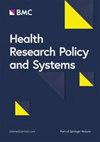Concept analysis of health system resilience
IF 3.6
2区 医学
Q1 HEALTH POLICY & SERVICES
引用次数: 0
Abstract
There are several definitions of resilience in health systems, many of which share some characteristics, but no agreed-upon framework is universally accepted. Here, we review the concept of resilience, identifying its definitions, attributes, antecedents and consequences, and present the findings of a concept analysis of health system resilience. We follow Schwarz-Barcott and Kim’s hybrid model, which consists of three phases: theoretical, fieldwork and final analysis. We identified the concept definitions, attributes, antecedents and consequences of health system resilience and constructed an evidence-informed framework on the basis of the findings of this review. We searched PubMed, PsycINFO, CINAHL Complete, EBSCOhost-Academic Search and Premier databases and downloaded identified titles and abstracts on Covidence. We screened 3357 titles and removed duplicate and ineligible records; two reviewers then screened each title, and disagreements were resolved by discussion with the third reviewer. From the 130 eligible manuscripts, we identified the definitions, attributes, antecedents and consequences using a pre-defined data extraction form. Resilience antecedents are decentralization, available funds, investments and resources, staff environment and motivation, integration and networking and finally, diversification of staff. The attributes are the availability of resources and funds, adaptive capacity, transformative capacity, learning and advocacy and progressive leadership. The consequences of health system resilience are improved health system performance, a balanced governance structure, improved expenditure and financial management of health and maintenance of health services that support universal health coverage (UHC) throughout crises. A resilient health system maintains quality healthcare through times of crisis. During the coronavirus disease 2019 (COVID-19) epidemic, several seemingly robust health systems were strained under the increased demand, and services were disrupted. As such, elements of resilience should be integrated into the functions of a health system to ensure standardized and consistent service quality and delivery. We offer a systematic, evidence-informed method for identifying the attributes of health system resilience, intending to eventually be used to develop a measuring tool to evaluate a country’s health system resilience performance.卫生系统复原力的概念分析
关于卫生系统复原力的定义有多种,其中许多都有一些共同特点,但没有一个公认的框架得到普遍接受。在此,我们回顾了抗灾能力的概念,确定了其定义、属性、前因和后果,并介绍了卫生系统抗灾能力概念分析的结果。我们遵循 Schwarz-Barcott 和 Kim 的混合模型,该模型包括三个阶段:理论、实地调查和最终分析。我们确定了卫生系统复原力的概念定义、属性、前因和后果,并在此综述结果的基础上构建了一个循证框架。我们检索了 PubMed、PsycINFO、CINAHL Complete、EBSCOhost-Academic Search 和 Premier 数据库,并在 Covidence 上下载了确定的标题和摘要。我们筛选了 3357 篇标题,删除了重复和不合格的记录;然后由两名审稿人对每篇标题进行筛选,并与第三名审稿人讨论解决分歧。从 130 篇符合条件的稿件中,我们使用预先定义的数据提取表确定了定义、属性、前因和后果。复原力的先决条件是权力下放、可用资金、投资和资源、工作人员环境和动力、整合和网络,最后是工作人员的多样化。属性是资源和资金的可用性、适应能力、变革能力、学习和宣传以及进步的领导能力。卫生系统复原力的结果是改善卫生系统的绩效,建立平衡的治理结构,改进卫生支出和财务管理,以及在整个危机期间维持支持全民医保(UHC)的卫生服务。具有复原力的卫生系统能够在危机期间保持高质量的医疗保健。在 2019 年冠状病毒病(COVID-19)疫情期间,一些看似强大的卫生系统在需求增加的情况下不堪重负,服务中断。因此,应将复原力要素融入医疗系统的各项功能中,以确保标准化和一致的服务质量和提供。我们提供了一种系统的、以证据为依据的方法来确定卫生系统复原力的属性,旨在最终用于开发一种测量工具,以评估一个国家卫生系统的复原力表现。
本文章由计算机程序翻译,如有差异,请以英文原文为准。
求助全文
约1分钟内获得全文
求助全文
来源期刊

Health Research Policy and Systems
HEALTH POLICY & SERVICES-
CiteScore
7.50
自引率
7.50%
发文量
124
审稿时长
27 weeks
期刊介绍:
Health Research Policy and Systems is an Open Access, peer-reviewed, online journal that aims to provide a platform for the global research community to share their views, findings, insights and successes. Health Research Policy and Systems considers manuscripts that investigate the role of evidence-based health policy and health research systems in ensuring the efficient utilization and application of knowledge to improve health and health equity, especially in developing countries. Research is the foundation for improvements in public health. The problem is that people involved in different areas of research, together with managers and administrators in charge of research entities, do not communicate sufficiently with each other.
 求助内容:
求助内容: 应助结果提醒方式:
应助结果提醒方式:


